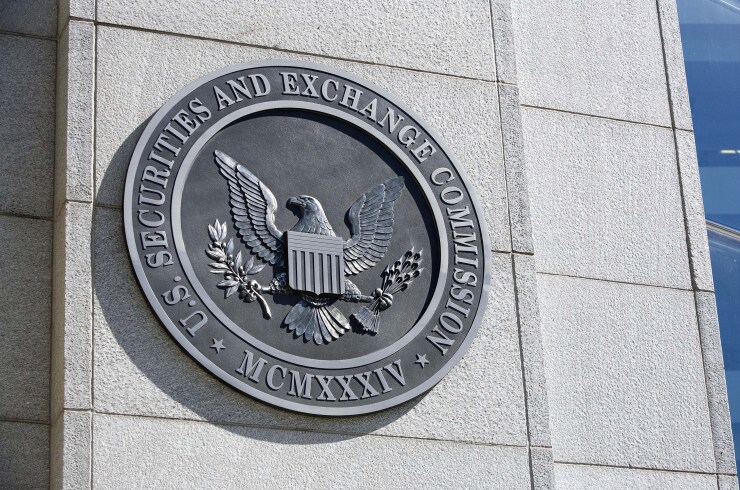The Securities and Exchange Commission has formed a Climate and ESG Task Force in its enforcement division to identify misconduct in environmental, social and governance reporting.
The task force will be spearheaded by Kelly L. Gibson, the SEC’s acting deputy director of enforcement, who will oversee an effort throughout the enforcement division, with 22 members drawn from SEC headquarters, regional offices and specialized enforcement units. They will work on initiatives to proactively identify ESG-related misconduct, as well as coordinate the effective use of enforcement division resources, using data analytics to mine and analyze information across companies to identify potential violators. They will initially focus on spotting any material gaps or misstatements in companies’ disclosure of climate risks under the existing SEC rules. They also plan to analyze disclosure and compliance issues regarding investment advisors’ and funds’ ESG strategies.

The SEC is putting a new focus on ESG reporting under its new acting director, Allison Herren Lee, in keeping with the Biden administration’s campaign pledge to combat climate change by rejoining the Paris climate agreement and encouraging the use of renewable energy.
“Climate risks and sustainability are critical issues for the investing public and our capital markets,” said Lee in a statement Thursday. “The task force announced today will play an important role in enhancing and coordinating the efforts of the Division of Enforcement, the Office of the Whistleblower and other parts of the agency to bolster the efforts of the Commission as a whole on these vital matters.”
Accounting firms are also putting more emphasis on ESG issues by offering assurance services to clients in line with sustainability standards. As the climate crisis takes on greater urgency after record-setting temperature increases and natural disasters last year, more major companies are making pledges for net zero carbon emissions. At the same time, standard-setters like the Sustainability Accounting Standards Board, the International Integrated Reporting Council, the Global Reporting Initiative, the Climate Disclosure Standards Board and the Carbon Disclosure Project have been trying to
The SEC’s Climate and ESG Task Force plans to evaluate and pursue tips, referrals and whistleblower complaints on ESG-related issues, and provide expertise and insight to teams working on ESG-related matters across the enforcement division. Along with the SEC’s enforcement division, the SEC’s examinations division is also making climate risks more of a priority. The SEC said Wednesday that climate-related risks would be among its top priorities this year, along with financial technology and conflicts of interest for brokers and investment advisors.
A
The Institute of Management Accountants has been working on improving ESG reporting at companies. “One thing that we are really focused on at IMA is thinking about what this means from a management perspective,” said Shari Littan, director of corporate reporting and research policy at the IMA. “What does it mean to have information around sustainable business information, and how can we use that internally for decision making? For example, we’re seeing incredible new demand for climate-related information from a disclosure standpoint. From the corporate standpoint, this means creating new systems, or looking at what internal data gathering is like, whether that’s controls or if oversight of that information is robust. We don’t want companies to be issuing information that’s less than quality information or becomes unreliable.”
All of the Big Four firms have made commitments to achieving net zero carbon emissions within the next decade: Ernst & Young by 2025, and PricewaterhouseCoopers, Deloitte and KPMG by 2030.
“ESG has been taking on significant momentum with companies,” said Sheri Wyatt, assurance diversity and inclusion leader and sustainability partner at PwC. “Their CEOs and CFOs have been making commitments around the progress they are looking to make with ESG, and DEI [diversity, equity and inclusion] fits in really nicely within the overall ESG journey.”
Some companies are leveraging their ESG and DEI efforts to gain new insights into their business, and those may come out of the SEC's regulatory, enforcement and management discussion and analysis efforts.
“The new MD&A disclosures on human capital resources that are coming online from the SEC regulations are leading to internal collaboration between those responsible for financial reporting and human resources, and sustainable business or corporate responsibility teams,” said Littan. “Those silos are breaking down and there’s a more collaborative business mindset that is required to meet those demands. But that’s challenging as well because obviously you’re instituting new reporting processes. We’re particularly watching at IMA the emphasis on external reporting, versus how all this new data and information can be used strategically for risk management, for innovation, for business model adaptation, agility, particularly post-pandemic. What does it mean for management to have all of this new data or new processes? What’s the value of not just reporting, for example, on diversity, equity and inclusion, but what does that mean for us as a business, and how can we take some of this sustainable business information that we’re going to produce externally and use it for management decision making in a new way to bring new insights into our business to move forward?”





